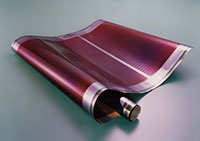News Release
Construction of a New Solar-cell Plant and Agreement on Strategic Cooperation with Kumamoto University and Kumamoto Techno Industrial Foundation
August 25,2005
Fuji Electric Systems Co., Ltd.
Fuji Electric Systems (President : Haruo Ito) announced today the establishment of a new solar cell plant that will support its full-scale entry into the solar cell market, at an industrial park in Nankan-machi, Tamana-gun, Kumamoto Prefecture.
To create new solar energy business opportunities, Fuji Electric Systems has also agreed to comprehensive three-party cooperation with Kumamoto University (President: Tatsuro Sakimoto) and the Kumamoto Techno Industrial Foundation (Managing Director: Yoshiko Shiotani).
1. Full-scale Market Entry
Last October, Fuji Electric Systems successfully developed the world's first mass-producible amorphous-silicon solar cell with a plastic film substrate and is now ready for full-scale entry into the market.
A. Product Features
Amidst growing concerns about the depletion of dwindling sources of silicon, our amorphous silicon solar cells are gathering attention because they are less than 1/100ths to 1/200ths the thickness of crystalline solar cells, and therefore require far less silicon to produce. They are also eco-friendly since much less energy is used for production than for crystalline solar cells.
Our amorphous silicon solar cells have drawn considerable interest since they first came to the market because of their unimaginable features, such as light weight and bendability. These features enable expanding usage as easy-to-design solar cells even in large sizes.
B. State-of-the-Art Plant Construction
The new plant will realize high-yield mass production using the "roll-to-roll production method," which is the result of co-development between Fuji Electric and the New Energy and Industrial Technology Development Organization (NEDO) applying Fuji Electric Group's distinctive technologies, such as semiconductors, magnetic disks, photoconductive drums, and so on.
As the plant aims to become an eco-friendly facility, it introduces Fuji Electric Systems' energy management technologies to optimize and minimize the consumption of energy, and will promote reducing and reusing wastes generated there.
Overview of the New Plant
C. Business Plan
(1) Targeted Markets
The solar cell market stands today at approximately 900 MW worldwide, but is expected to grow significantly at an average rate of 30% a year mainly in Europe and North America. Fuji Electric Systems is focusing on the markets that match the features of its solar cells, such as vending machines, reservoir covers at water treatment plants, and rooftop waterproofing sheets. We will also expand into curved and/or wide buildings, such as gymnasiums and factories, using solar modules integrated with steel plates, which are already commercially available.
Fuji Electric Systems will aggressively introduce products to the international market, especially to German and other European markets, as well as the Chinese market.
(2) Production and Sales
Current plans for the first year of operation in fiscal 2006 call for a production capacity of approximately 7 MW and sales of 2,000 million yen a year. Another round of production investment will boost capacity in 2009 to approximately 30 MW and sales to roughly 7,000 million yen a year. Eventually, anticipated improvements will yield a production capacity of at least 100 MW per year.
The overall scale of the solar energy business is expected to be nearly five times of the sales amount of solar modules, including support industries such as related construction work, inverters, and energy distribution and optimization.
2. Industry-University-Government Cooperation
The goal of the cooperative agreement concluded by Kumamoto University, the Kumamoto Techno Industrial Foundation, and Fuji Electric Systems is to conduct research and development, develop human resources, start up and foster local industries, and create employment opportunities in the field of natural energy based on amorphous silicon cell technology developed by Fuji Electric Systems. The three parties have agreed to comprehensive cooperation in the following areas.
A. Association for Solar Energy Business Promotion
The main functions of the association are as follows:
B. Agreement between Kumamoto University and Fuji Electric Systems

